Iri ji (Yam)Festival in Ibeku - What has become of Igbo cultural heritage
I have always wanted to write about this sad event but I've been so busy and sometimes unable to put an expression to the recent abnormality which has encapsulated our once revered cultural heritage.
I decided to take my fiancee out, it was a wonderful day, bright and sunny, we went to the mall, had some cold drinks with rice and chicken, we went round the shopping mall, holding hands, savouring the moment and taking cute pictures. We then decided to go home since the night was fast approaching.


At the park where we board buses or tricycles heading to our destination, we found out there was an unusual increase in the fares and I enquired why the increase, the driver replied by saying that the iri ji festival i.e yam festival is ongoing and the young people have blocked the road brandishing weapons and he has to settle them at different stops before we get to our destination hence the increase in fares, we had no choice than to join the driver.
As we began to approach the place of celebration, we saw young people between age 14 and 40 in droves, behaving unruly, most carry weapons, harassing car owners, smashing windscreens and even attacking some people. I heard it is also the time some uses to settle long standing disputes. Some get cut with machete, loss of lives and properties are also recorded.
There was heavy traffic because of this, you see young boys and girls trying to sexually harass you, one of them who was a girl, maybe in her early 20's stretched her hands to touch, she said "bros, you too fine oo, make I kiss you know", I was so stone faced, I ignored her, another guy was trying to touch my fiancee from where I was seated, she slapped his hands away.
We managed to pass all of them unscathed, we later heard some people who came quite late at night were robbed of their properties, this madness made me to go and do a research of the Igbo culture and also the celebration of the New Yam Festival because as a Christian I don't spend time with some cultural practices due to some negative associated ills, but I believe culture has been there for a while and there must be a right way of doing it before this menace has overridden it.
HISTORY
In Igbo land, The New Yam Festival which is called Iri ji, Iwa ji or Ike ji, depending on the dialect is an annual cultural festival by the Igbo people held at the end of the rainy season in early August.
The Iwa ji festival symbolizes the conclusion of a harvest and the beginning of the next work cycle. The celebration is a very culturally based occasion, tying individual Igbo communities together as essentially agrarian and dependent on yam.
According to the Igbo cultural heritage, yams are the first crop to be harvested, and are the most important crop of the region. The New Yam Festival is therefore a celebration depicting the prominence of yam in the social-cultural life of Igbo people. The evening prior to the day of the festival, all old yams (from the previous year's crop) are consumed or discarded. This is because it is believed that the New Year must begin with tasty, fresh yams instead of the old dried-up crops of the previous year. The next day, only dishes of yam are served at the feast, as the festival is symbolic of the abundance of the produce.
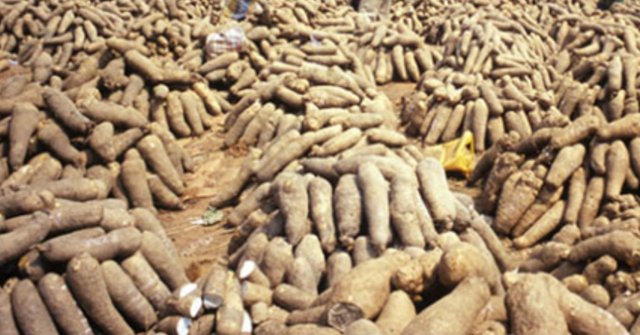
source
Though the style and methods may differ from one community to the next, the essential components that make up the festival remain the same. In some communities the celebration lasts a whole day, while in many places it may last a week or more. These festivities normally include a variety of entertainments and ceremony, including the performance of rites by the Igwe (King), or the eldest man, and cultural dances by Igbo men, women, and their children. The festival features Igbo cultural activities in the form of contemporary shows, masquerade dances, and fashion parades.
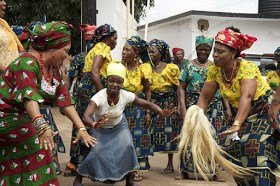
source
The Iwa-ji ceremony begins firstly by the yams offered to gods and ancestors first before distributing them to the villagers. The ritual is performed either by the oldest man in the community or by the king or eminent title holder. This man also offers the yams to
God, deities and ancestors by showing gratitude to God for his protection and kindness in leading them from lean periods to the time of bountiful harvest without deaths resulting from hunger. After the prayer of thanksgiving to God, they eat the first yam because It is believed that their position bestows the privilege of being intermediaries between their communities and the gods of the land. The rituals are meant to express the gratitude of the community to the gods for making the harvest possible, and they are widely followed despite more modern changes due to the influence of Christianity in the area. This therefore explains the three aspect of Igbo worldview, that they are Pragmatic, religious and appreciative.
The day is symbolic of enjoyment after the cultivation season, and the plenty is shared with friends and well-wishers. A variety of festivities mark the eating of new yam. Folk dances , masquerades , parades , and parties create an experience that some participants characterize as "art"; the colorful festival is a spectacle of exhibited joy, thanks, and community display.
Palm oil (mmanu nri) is used to eat the yam.
This event is important event in the calendar of Igbo people all over the world.
The harvest of yam and the celebration of the God of the land through the New Yam festival is an epitome of the people’s religious belief in the supreme deity. The coming of the new moon in the month of August marks the preparation for the great “Iri Ji Ohu” festival, but the time and mode of preparation differs from community to community.
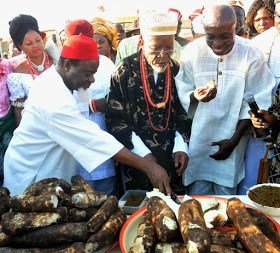
source
The New Yam festival is a highly captivating art event. The colourful festival is a visual spectacle of coherence, of dance, of joy and feasting, an annual display for community members, to mark the end of the cultivation season, a festival where the people express their gratitude to those that helped them reap a bountiful harvest.
That is a summary of The New yam festival in the igbo culture. Now let's look at the Ibeku people and how they celebrate theirs.
IBEKU is a nation of seven sub-clans (Egwu-Asaa). These seven sub-clans are each made up of communities which themselves are composed of a cluster of villages having the same culture, custom, igbo language , tradition and heritage . The structure can be arranged literally, even if simplistically, as follows starting from the base.
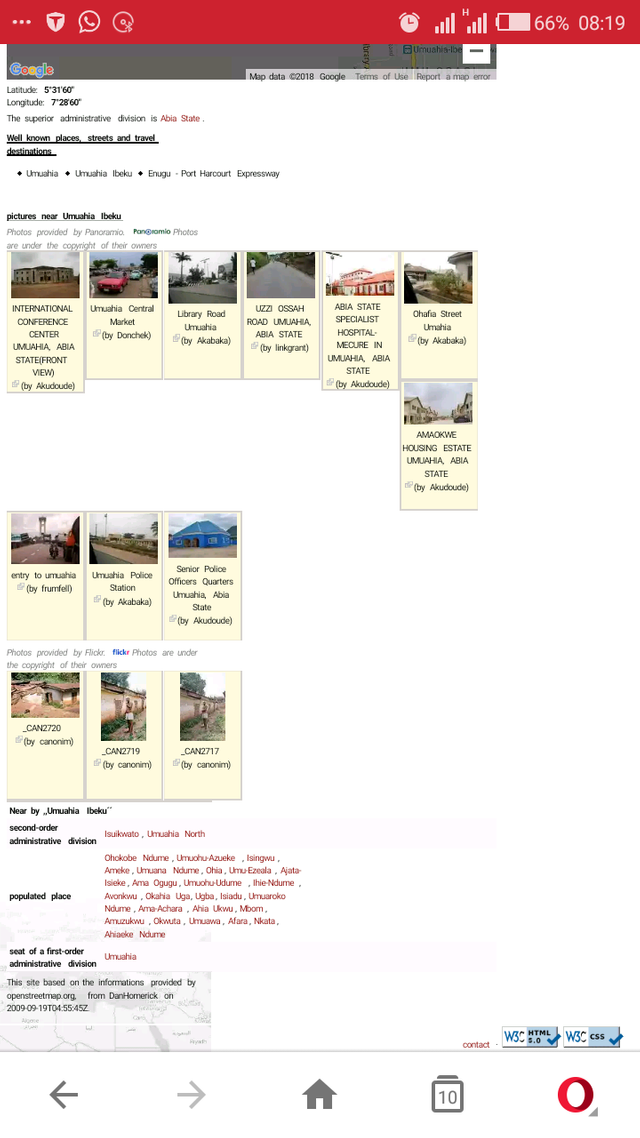
There are altogether 47 villages on record. But strictly speaking, there are more than 50 villages in Ibeku, given the size of such sprawling communities as Amuzukwu, Mbom, Amaeke and Okwuta, which are on record as villages. This misnomer of classifying communities as villages can be attributed to not being conversant with the hinterland, coupled with the colonial administration’s preference for convenience in running native affairs. Even so, it was considered a wise idea in those days not to give out your full numerical strength and size for many logistic reasons. This mistaken notion of numeration, or deliberately falsified population information, affected adversely, on the one hand, the provision of adequate amenities usually provided according to population and, on the other hand, advantageously camouflaged the strength of the people in terms of manpower in the event of war, or payment of taxes or other tributes to foreign overlords.
Ibeku has one EZE called THE OGURUBE IBEKU. The OGURUBE title is a 20th century event.
Ibeku is made up of seven [asaa] brothers called EGWU. Thus the name :IBEKU EGWU ASAA.
These are the names of the seven clans that makes up Ibeku:
AFARATA
- Amuzu Ukwu
- Amuezeagwu
- Mbom
- Ugba
- Nkata
- Amaeke
- Isiadu
AFARA UKWU
- Isiama
- Okwulaga
- Ohokobe na Umuokeyi
AMAOFORO
- Ajata-Okwuru
- Iyienyi
- Avo nkwu
- Amuzu ora
- Erote
EMEDE
- Nkpuru
- Ata
- Umuakanu
- Umuagu
- Umueze
- Agbo
- Umuodudu
- Odide
- Ubani
ISIEKE
- Umuajiji
- Okwuta
- Ihie
- Ajata
- Ukome
- Okwoiyi
NDUME
- Umuafai
- Umuezeala
- Ohokobe
- Umuohu
- Ahieke
- Ihie
- Umuana
- Lodu
- Umuhute
- Umuaroko
- Umuohu-Azueke
OSAAH
- Uzi
- Eziama
- Mgbaja
- Uhabiri
- Umuchima
- Amanso
The heads or the leaders of all Egwus meet with the OGURUBE to set the agenda of Ibeku as a whole
Prior to 2000, these groups never had their own Eze but they had Chiefs that worked with the Ogurube Ibeku. Now these chiefs have been converted to Eze Titles.
Even though their Chieftaincy Titles have been upgraded to Ezeships. All Ibeku agree that we still have one overall OGURUBE and that will keep the Ibeku Title.
Every one of these groups works with the Ogurube Ibeku. They meet with the Ogurube to set dates for events and ceremonies including the IRI JI festival.
The Ibeku Iri ji festival is characterized by the showcasing of the rich cultural values of Ibeku land with special emphasis on developing and sustaining the culture of Igbo people.
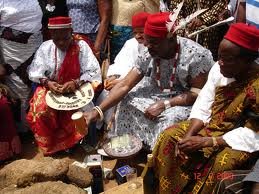
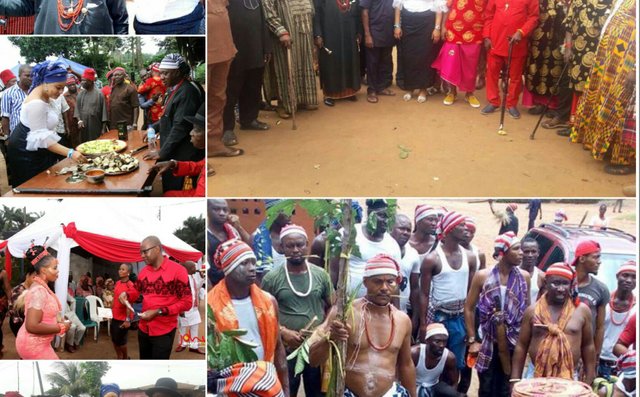
The annual event usually features:
- Documentary Film on the History of Ibeku Ancient Kingdon
- Cultural Displays
- Road Proccession by Ibeku Youths
- Stage Performances
Several communities from the seven clans of of Ibeku land will are well represented at the colourful ceremony.
The Communities in Ibeku Land are adorned in their colourful traditional attires with drummers and dancers during the road show and procession. A minimum of 300 people represents each of the seven clans of Ibeku Land.
It is expected that over 3000 participants always take part in the annual event. This guarantees high volume of sponsors product sales and image projection.
The sponsors tends to enjoy:
- Exclusivity
- Product sales/promotion
- Direct contact with consumers
- Brand visibility
- Mention in all publicity formats
So from all these, the Iri ji festival is supposed to bring joy and even economic benefits to the land, but these youths have turned it to an avenue for mass looting, violence and cult activities.
It is even worrying that the law enforcement agency seems to keep mute on this matter while the elders sit back and watch. What has happened to our cultural heritage, what is happening to our cultural pride. We need to wake up, we need to restore the ancient land marks that fosters peace and prosperity.
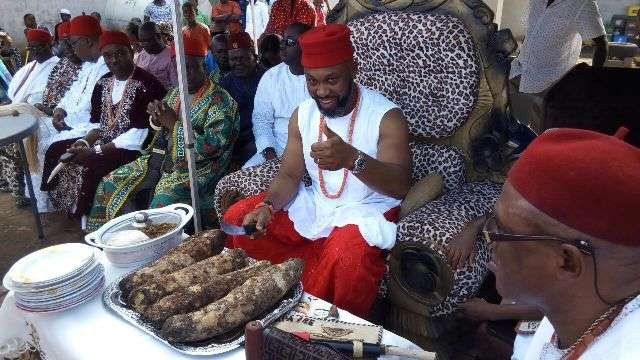
@greenewalks, thank you for using the naijapidgin tag.
We encourage and support minnows.
Join us on discord: https://discord.gg/5SR8CH4 for more fun and to submit your posts for curation.
You like what we are doing and would like to support us? Delegate SP to us Or Join our trail here: https://steemauto.com/dash.php?i=15&id=1&user=naijapidgin
Hello! I find your post valuable for the wafrica community! Thanks for the great post! We encourage and support quality contents and projects from the West African region.
Do you have a suggestion, concern or want to appear as a guest author on WAfrica, join our discord server and discuss with a member of our curation team.
Don't forget to join us every Sunday by 20:30GMT for our Sunday WAFRO party on our discord channel. Thank you.
Wow! Im blown away by this accounting! Great article bruv
#Bigwaves
Thanks a lot
Bless u ma
Congratulations @greenewalks! You have completed the following achievement on the Steem blockchain and have been rewarded with new badge(s) :
Click here to view your Board of Honor
If you no longer want to receive notifications, reply to this comment with the word
STOPDo not miss the last post from @steemitboard: